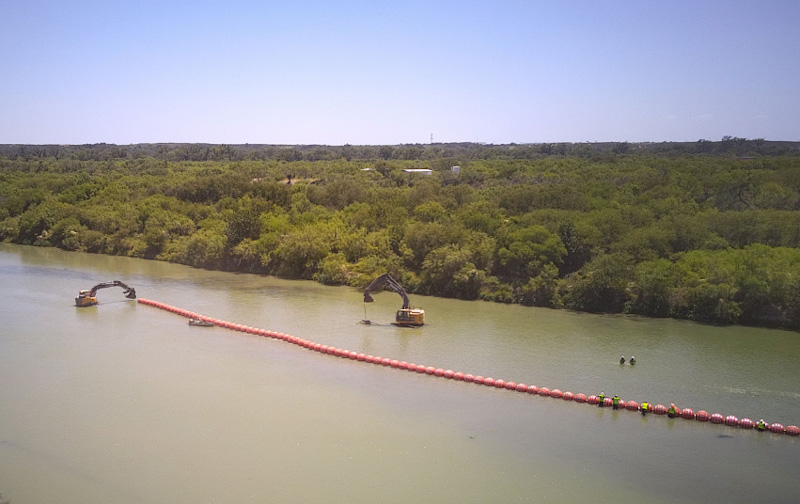5th Circuit avoids immigration-invasion argument in ruling for Texas in buoy barrier case

A Texas effort to deter illegal immigration with floating buoys in the Rio Grande River got a boost Tuesday, when a federal appeals court permitted the state to keep the 1,000-foot barrier in place during a legal challenge. (Photo from the July 24, 2023, federal lawsuit)
A Texas effort to deter illegal immigration with floating buoys in the Rio Grande River got a boost Tuesday, when a federal appeals court permitted the state to keep the 1,000-foot barrier in place during a legal challenge.
The en banc 5th U.S. Circuit Court of Appeals at New Orleans rejected the U.S. Department of Justice’s reading of a statute called the Rivers and Harbors Appropriation Act of 1899. The law bars obstructions in navigable waterways.
The United States will likely be unable to prove that the barrier is located in a navigable stretch on the Rio Grande, the 5th Circuit majority said. As a result, the district court abused its discretion when it required Texas to move the barrier to the riverbank, the appeals court concluded in the July 30 opinion.
Law360 and Reuters are among the publications with stories.
Republican Texas Attorney General Ken Paxton called the decision “a major victory” in a July 31 press release.
The majority opinion by Judge Don R. Willett didn’t reach a second argument by Texas, the Volokh Conspiracy reports. The argument is that Texas can place the buoys in the river, even if federal law forbids it, under one of the invasion clauses of the Constitution.
Texas claims that illegal immigration and drug smuggling constitute an “invasion” permitting its action.
The clause is at Article I, Section 10, Clause 3 of the Constitution, according to the Volokh Conspiracy. It states that “no state shall, without the consent of Congress, … engage in war, unless actually invaded, or in such imminent danger as will not admit of delay.”
Judge James C. Ho addressed the argument in a concurrence in the judgment and partial dissent. He maintained that courts must defer to the Texas governor on the meaning of “invasion,” as long as the governor is acting in good faith, the Volokh Conspiracy reports. Courts can’t act, Ho said, because of the nonjusticiable political question.
Texas is also making the invasion argument in a separate lawsuit challenging a state law authorizing police officers to detain and deport immigrants.
Willett is an appointee of former President Donald Trump. His opinion was joined by eight judges, while two others concurred in the judgment. Seven judges dissented.
The case is United States v. Abbott.
Write a letter to the editor, share a story tip or update, or report an error.



